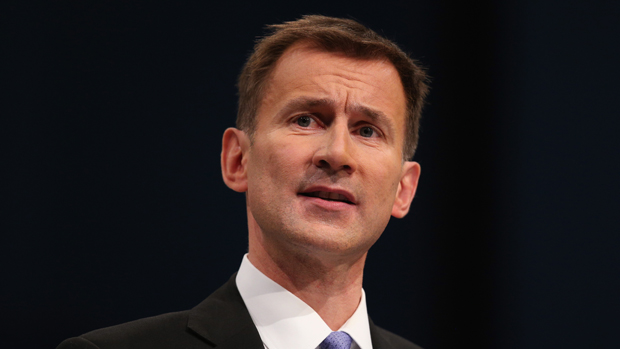NHS crisis: how Jeremy Hunt plans to cut hospital spending
The government to clamp down on 'rip-off' staffing agencies and expensive management consultants

A free daily email with the biggest news stories of the day – and the best features from TheWeek.com
You are now subscribed
Your newsletter sign-up was successful
Health Secretary Jeremy Hunt is calling for a clampdown on excessive spending and an over-reliance on agency doctors and nurses in order to meet NHS savings targets.
"Expensive staffing agencies are quite simply ripping off the NHS," he wrote in the Daily Telegraph.
Hospitals paid out £3.3bn in agency fees last year and are increasingly hiring expensive management consultants, which cost the NHS nearly £600m last year, the BBC reports.
The Week
Escape your echo chamber. Get the facts behind the news, plus analysis from multiple perspectives.

Sign up for The Week's Free Newsletters
From our morning news briefing to a weekly Good News Newsletter, get the best of The Week delivered directly to your inbox.
From our morning news briefing to a weekly Good News Newsletter, get the best of The Week delivered directly to your inbox.
Health service managers are also facing calls to justify their large pay packets, with more than a fifth of all directors in the NHS earning more than £142,500 – equivalent to the Prime Minister's salary.
The government has promised to increase healthcare spending by £8bn a year by the end of the decade in order to plug the funding gap and maintain services. In return, health bosses have vowed to make £22bn in savings
Hunt said the government had delivered on its end of the deal. "Now the NHS must deliver its side of the bargain for patients by eliminating waste, helped by the controls on spending we're putting in place," he said.
The measures that will be phased in over the next two months include:
A free daily email with the biggest news stories of the day – and the best features from TheWeek.com
- A maximum hourly rate for agency doctors and nurses
- The use of unapproved agencies will be banned
- A cap on total agency spending for NHS trusts in financial difficulty
- A limit of £50,000 will be placed on all management-consultancy contracts
- The introduction of a centralised system for buying goods in order to cut procurement costs
The curbs on spending have been criticised by the Recruitment and Employment Confederation, which represents the agencies. It said they were being made scapegoats "for the NHS's own mismanagement of workforce planning".
“What happens, for instance, if there is a cold snap and a trust needs staff instantly to manage an influx of demand but they have already reached their newly imposed cap?" asked Tom Hadley, director of policy at the organisation.
The head of the Royal College of Nursing, Dr Peter Carter, welcomed the clampdown on spending but said it would "only work alongside longer term solutions, like converting agency staff to permanent staff, and continuing to increase training places to catch up with demand".
-
 Local elections 2026: where are they and who is expected to win?
Local elections 2026: where are they and who is expected to win?The Explainer Labour is braced for heavy losses and U-turn on postponing some council elections hasn’t helped the party’s prospects
-
 6 of the world’s most accessible destinations
6 of the world’s most accessible destinationsThe Week Recommends Experience all of Berlin, Singapore and Sydney
-
 How the FCC’s ‘equal time’ rule works
How the FCC’s ‘equal time’ rule worksIn the Spotlight The law is at the heart of the Colbert-CBS conflict
-
 A real head scratcher: how scabies returned to the UK
A real head scratcher: how scabies returned to the UKThe Explainer The ‘Victorian-era’ condition is on the rise in the UK, and experts aren’t sure why
-
 How dangerous is the ‘K’ strain super-flu?
How dangerous is the ‘K’ strain super-flu?The Explainer Surge in cases of new variant H3N2 flu in UK and around the world
-
 The ‘menopause gold rush’
The ‘menopause gold rush’Under the Radar Women vulnerable to misinformation and marketing of ‘unregulated’ products
-
 How the care industry came to rely on migrant workers
How the care industry came to rely on migrant workersThe Explainer Government crackdown on recruiting workers abroad risks deepening care sector crisis, industry leaders warn
-
 Could medics' misgivings spell the end of the assisted dying bill?
Could medics' misgivings spell the end of the assisted dying bill?Today's Big Question The Royal College of Psychiatrists has identified 'serious concerns' with the landmark bill – and MPs are taking notice
-
 Washwood Heath: Birmingham's pioneering neighbourhood health service
Washwood Heath: Birmingham's pioneering neighbourhood health serviceIn the Spotlight NHS England chair says there is a 'really good argument this is the model for the future'
-
 The UK's first legal drug consumption room
The UK's first legal drug consumption roomThe Explainer 'Potentially transformative moment in UK drugs policy' as The Thistle opens in Glasgow
-
 How can the UK solve the adult social care crisis?
How can the UK solve the adult social care crisis?Today's Big Question New commission announced to turn our buckling care sector around: yet more delay or finally a way forward?